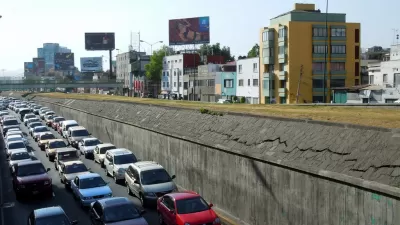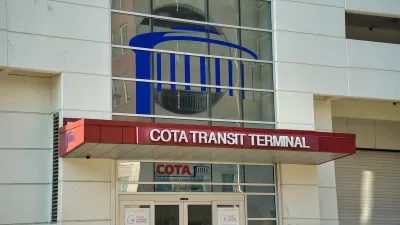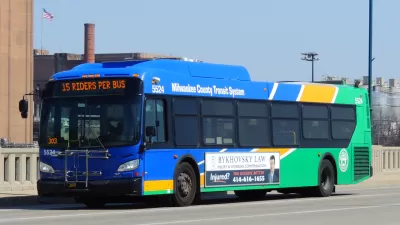Mexico City's emergence as a "commuter's paradise" due to a focus on people and places, rather than cars and driving, has earned the city this year's Sustainable Transport Award from the Institute for Transportation and Development Policy (ITDP).

Josie Garthwaite details how the Mexican capital's embrace of bicycles, pedestrian-friendly plazas and walkways, new bus lines, and parking meters (?), has transformed it from commuter hell to paradise in just a couple of years.
"'They really changed quite fundamentally the direction and vision of the city, and a lot of it was in 2012,' said Walter Hook, chief executive of ITDP, an international nonprofit that works with cities to reduce greenhouse gas emissions and improve quality of urban life."
"Since 2011," explains Garthwaite, "Mexico City has added two new bus corridors to its Metrobus system, connecting the narrow streets in the historic center to the airport and making it the longest bus rapid transit (BRT) system in Latin America. The city also added nearly 90 stations and 1,200 new bicycles to the Ecobici bike-sharing program, began to reform on-street parking, improved sidewalks, and established new walkways. Cars were removed entirely from some narrow streets to make room for free flow of buses and pedestrians, and marketplaces were established for street vendors to help unclog the corridors."
And about those parking meters? "The new parking system, called ecoParq, introduced multispace meters to thousands of parking spots on streets where parking previously had been free—officially free, anyway." Although the unregulated valets or attendants known as franeleros, who controlled much of the city's on-street parking, protested the changes, "ecoParq has proven to be popular among many residents," notes Garthwaite.
FULL STORY: Bikes and Buses Propel Mexico City to Prize in Sustainable Transport

Alabama: Trump Terminates Settlements for Black Communities Harmed By Raw Sewage
Trump deemed the landmark civil rights agreement “illegal DEI and environmental justice policy.”

Planetizen Federal Action Tracker
A weekly monitor of how Trump’s orders and actions are impacting planners and planning in America.

The 120 Year Old Tiny Home Villages That Sheltered San Francisco’s Earthquake Refugees
More than a century ago, San Francisco mobilized to house thousands of residents displaced by the 1906 earthquake. Could their strategy offer a model for the present?

In Both Crashes and Crime, Public Transportation is Far Safer than Driving
Contrary to popular assumptions, public transportation has far lower crash and crime rates than automobile travel. For safer communities, improve and encourage transit travel.

Report: Zoning Reforms Should Complement Nashville’s Ambitious Transit Plan
Without reform, restrictive zoning codes will limit the impact of the city’s planned transit expansion and could exclude some of the residents who depend on transit the most.

Judge Orders Release of Frozen IRA, IIJA Funding
The decision is a victory for environmental groups who charged that freezing funds for critical infrastructure and disaster response programs caused “real and irreparable harm” to communities.
Urban Design for Planners 1: Software Tools
This six-course series explores essential urban design concepts using open source software and equips planners with the tools they need to participate fully in the urban design process.
Planning for Universal Design
Learn the tools for implementing Universal Design in planning regulations.
Clanton & Associates, Inc.
Jessamine County Fiscal Court
Institute for Housing and Urban Development Studies (IHS)
City of Grandview
Harvard GSD Executive Education
Toledo-Lucas County Plan Commissions
Salt Lake City
NYU Wagner Graduate School of Public Service




























